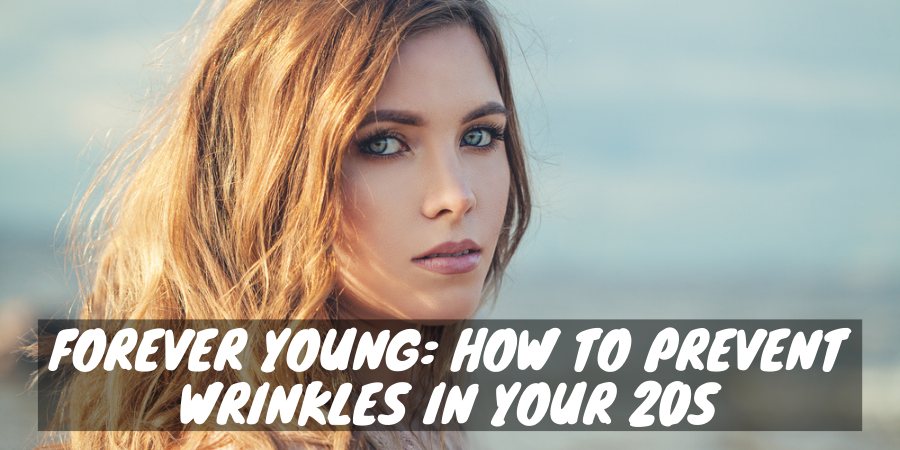When you’re in your 20s, it’s easy to forget that life won’t always be like it is.
You’ll get new responsibilities, experience changing worldviews… and have to deal with aging skin.
Now, that last bit may not sound as existential as the others. But don’t underestimate the role that healthy skin plays in your self-esteem and overall mindset.
Before long, you’ll start to notice thinning skin, sagginess, and wrinkles forming on your face. That’s why when it comes to wrinkle prevention, there’s no better time to start than right now.
Why Do Wrinkles Start Appearing in Your 20s?

Your early 20s are a time of exploration, growth and good skin.
During this time, your collagen levels are high, keeping your skin full, thick, plump and smooth.
But once you hit 25 or so, your skin starts producing less collagen. This makes your skin less able to hold its shape, causing it to stretch out, droop, crease and wrinkle.
It’s totally normal for collagen production to decrease starting in your mid-20s. But the decrease can be exacerbated by many different factors.
Smoking, Drinking and Other Bad Habits
If you smoke cigarettes, drink alcohol or use drugs, you’re damaging your skin without even knowing it.
Smoking, for instance, causes your blood vessels to constrict, which damages your collagen and weakens your skin.
And alcohol consumption produces free radicals, which attack and destroy your collagen supply.
Poor Diet and Dehydration
Your body needs certain nutrients, like magnesium and vitamin C, to produce collagen.
If you don’t get enough of these nutrients, your collagen production will decrease accordingly. Your skin will also be less resistant to environmental damage.
Chronic dehydration also inhibits the functionality of your skin cells, thus preventing them from producing enough collagen.
Inadequate Sleep and High Stress
Beauty rest isn’t just a myth — it’s very real and very essential for collagen production.
Without a good night’s sleep, your skin won’t have enough energy to produce the collagen it needs to stay healthy.
It’s much the same with stress, which has the added effect of altering your hormones, throwing your skin even further off balance.
Why Should You Take Anti-Aging Seriously in Your 20s?

Few people realize how deeply they’re affected by wrinkling skin until it’s too late to really put a stop to it.
It doesn’t help that for so many years, anti-aging skin treatments were only advertised to women in their 30s, 40s and beyond.
But as with so many other health problems, prevention is key when it comes to skin aging.
And it’s more important now than ever before: pollution, high stress levels and other factors are causing the signs of aging to set in much earlier than they ever did before.
By being proactive about your anti-aging skincare and taking the time now to look after your skin, you’re setting yourself up for many more years of a beautiful, healthy, smooth complexion.
Is Anti-Aging Only About Looking Young?
But what if you’re not concerned about wrinkles? Is anti-aging still important?
The answer is a resounding yes. Anti-aging skincare isn’t just about looks — it’s about overall skin health.
Aged skin doesn’t just look different from young skin. It’s less resilient against damage and more likely to experience wounding and scarring.
The signs of aging aren’t just superficial. They’re remnants of previous damage from the sun, the environment and poor skincare — so by preventing them, you’re also protecting your skin from harm.
How to Incorporate Anti-Aging Into Your Skincare Routine
Know Your Skin Type and Use Suitable Products
One of the biggest skincare mistakes that 20-somethings make is not knowing their skin type.
Skin can generally be sorted into four categories: normal, oily, dry and combination (both oily and dry in different areas). And any of these skin types can also be sensitive, reacting badly to various products and ingredients.
Knowing your skin type allows you to formulate your ideal skincare routine and helps you select the best products.
Oily skin, for instance, won’t respond well to ultra-moisturizing products designed for dry skin. And if you have dry skin, the oil-zapping ingredients found in products for oily skin will only make your problems worse.
By focusing on products that are suitable for your skin type, you can get the most out of your routine and keep your youthful looks around longer.
Make Sure to Stay Hydrated
If you don’t drink enough water, you can kiss your skincare goals goodbye no matter what products you use or treatments you get.
That’s because if your skin cells are dehydrated, they won’t be able to heal themselves, produce more collagen or maintain their shape. Your skin will age faster and take more damage as a result.
The average adult needs at least eight glasses of water a day to maintain proper hydration levels. If you’re taller, heavier or more active than average, you’ll need more than that.
You can pad your water intake by eating water-rich foods (like fresh produce) and consuming other beverages — these also count towards your daily goal. But plain, pure water remains the best option for staying hydrated and keeping your skin smooth, clear and healthy.
Start Using Wrinkle Prevention Treatments
Don’t wait until your wrinkles really set in to start taking care of them.
Believe it or not, you can keep them at bay before they even begin to show up on your skin!
Now’s the time to start incorporating anti-aging and wrinkle prevention treatments into your routine.
Start with antioxidant creams that contain vitamin C, vitamin E, green tea extract, acai or similar ingredients. These will decrease the concentration of free radicals in your skin, staving off wrinkles and other signs of aging.
You can also use a collagen cream to supplement your natural collagen production, further delaying the onset of wrinkles.
And consider trying cosmetic injectables to smooth out your forehead, eyes, mouth and other expressive areas that are likely to wrinkle first.
Wear Sunscreen Every Single Day

It doesn’t matter if it’s cloudy or if you’re staying indoors — you need to wear sunscreen every single day.
The sun’s damaging UV rays can penetrate through trees, clouds and glass, so even if you’re not in direct sunlight, you’re still absorbing them.
These UV rays cause rapid photoaging, including discoloration, dark spots, fine lines, dryness, thinning, sagging and wrinkling. And over time, they actually cause the DNA in your skin cells to mutate, resulting in eventual skin cancer.
That’s why your morning skincare routine needs to include a broad spectrum, SPF 30+ sunscreen, rain or shine. And make sure to reapply it every two hours throughout the day for continual protection.
Invest in a Quality Eye Cream
Often, the eyes are the first place to show signs of aging skin.
The skin around your eyes is some of the thinnest on your body. That’s why it’s typically the first to start becoming discolored, saggy or wrinkly.
Additionally, the fat stores under your eyes start to disappear in your 20s, resulting in a hollow appearance that only gets worse as you get older.
A high-quality eye cream, when used regularly, can slow down these processes and keep your eyes looking younger for longer.
Look for a hydrating eye cream that contains hyaluronic acid or other humectants. Use a lightweight cream during the day and a rich, moisturizing one at night to promote healing.
It’s much easier to prevent aging than it is to reverse it, so start now while your skin is still in top form!
Consider Advanced Skin Treatments
There’s only so much you can do for your skin at home. If you really want to prevent wrinkles and other signs of aging, you’ll need to visit a professional.
Professional anti-aging treatments target a wide range of skin problems, offering prevention as well as reversal.
Microneedling is a popular choice, involving the use of tiny needles to punch microscopic holes in your skin. This causes an increase in collagen production to repair the holes as well as any other damage in the area.
Chemical peels are also popular, offering powerful exfoliation via the use of a chemical solution like high-strength salicylic acid. They’re great at removing fine lines, acne scars, stretch marks, and shallow wrinkles.
You’ll need to visit an esthetician, dermatologist or cosmetic surgeon to determine which is best for you. They’re pricier and less convenient than at-home treatments, but they’re worth it if you want the strongest wrinkle prevention available.

